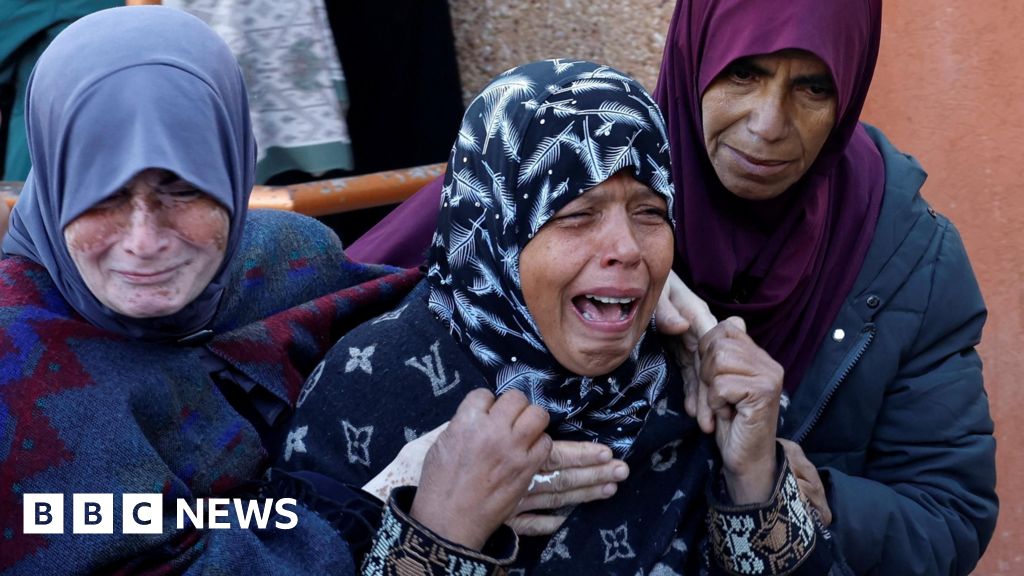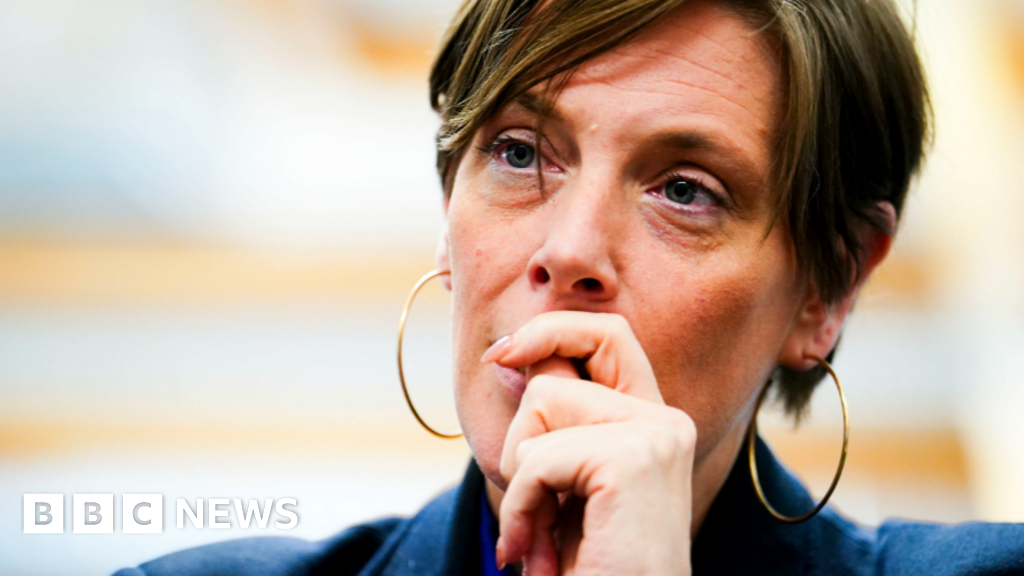
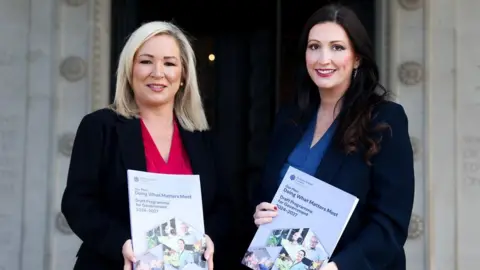 NI Executive
NI Executive
Michelle O'Neill (left) and Emma Little-Pengelly head up Northern Ireland's Executive
A public consultation has started on the Northern Ireland Executive's draft programme for government (PfG).
The executive’s agenda was signed off on Thursday and presented to assembly members on Monday.
The 88-page document, entitled 'Our Plan: Doing What Matters Most', sets out the executive's ambitions under several core areas.
It outlines nine "immediate priorities" the executive intends to work on this year and for the duration of its electoral mandate.
Outlining the plan, Deputy First Minister Emma-Little Pengelly told the chamber: "We must all focus on delivering this programme together for everyone.
"We know that there are challenges but there are opportunities."
First Minister Michelle O'Neill described the programme as a "draft document" and said the Executive is in "listening mode".
"This is very much the basis in which we think we can go out to consultation but there is no doubt that there will be very constructive comments that will come forward," Ms O'Neill said.
She added that the executive will have an eight-week consultation period with twelve weeks for an equality impact screening.
What are the Executive's nine priorities?
Ms Little-Pengelly outlined there would be nine priorities for the Executive in its current mandate.
- Grow a globally competitive and sustainable economy
- Deliver more affordable childcare
- Cut health waiting lists
- Ending violence against women and girls
- Better support for children and young people with special educational needs
- Provide more social, affordable and sustainable housing
- Safer communities
- Protect Lough Neagh and the environment
- Reform and transformation of public services

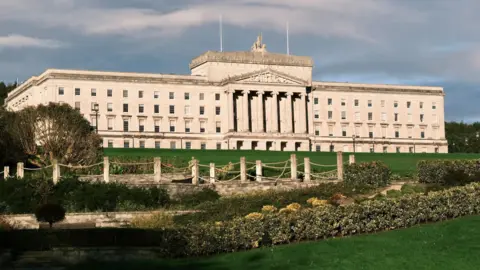
The Executive's priorities were presented to the Northern Ireland Assembly on Monday
The paper highlighted the executive will "make progress" on the long-delayed redevelopment of Casement Park GAA stadium in west Belfast.
It will also be "considering" the recommendations of the All-Island Rail Review, which proposed a major investment in the railway network.
Other areas include a commitment to expand Ulster University's Magee campus in Londonderry to accommodate up to 10,000 students, with an "action plan" to be published by the end of the year.
Earlier, Economy Minister Conor Murphy outlined a three-year business plan for his department.
Its 41 action points include plans to improve skills, productivity, tourism and energy.
“We aren’t going to change the economy over three years, but we want to set it on the right trajectory,” he told an audience of Northern Ireland Chamber members on Monday.

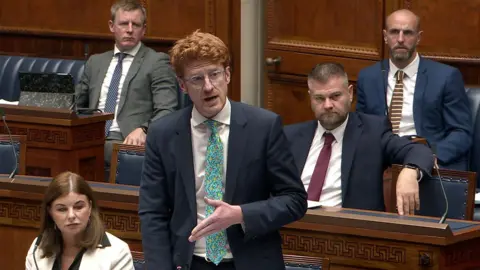
Matthew O'Toole, from the SDLP, leads the opposition in the assembly
The Ulster Unionist Party (UUP) withheld support for the recent budget because of the allocation of cash to the health ministry which it holds.
This time the new Ulster Unionist leader-in-waiting Mike Nesbitt said voting against the programme for government was not even on his radar.
The SDLP leader of the opposition Matthew O’Toole previously said of the draft PfG “to call it broad brush would be generous”.
Speaking on Monday, he welcomed the fact that the document had been published, given that the opposition had been "constructive in calling for a (PfG) for months now".
Mr O'Toole called for ministers to address the target for reducing waiting list times, as he could not find this when looking through the document.
What reaction has there been to the PfG?
Mark Spence from the Construction Employers Federation said the document falls “drastically short” of what is needed in order to deal with Northern Ireland's housing crisis.
"It is vital that urgent steps are taken to deal with decades of underfunding in our water and wastewater system which means that homebuilders cannot get new housing connections and a planning system which is no longer fit for purpose," he said.
Glyn Roberts from Retail NI said the PfG "needs to be a co-design with business and other key stakeholders in civic society if we are to realise and share the full potential of this region".
"We want to be partners, not just consultees in the implementation of the new Programme for Government," Mr Roberts added.
Suzanne Wylie from the NI Chamber said despite a challenging fiscal environment it was time for "ambitious delivery" after a decade without a PfG.
Northern Ireland's Children's Commissioner Chris Quinn said: “Whilst there are positives, I am disappointed that is no specific outcome focusing on children and young people, as there was previously, and I would have expected outcomes in addressing child poverty to be a fundamental aspect of the PfG."
What is the Northern Ireland Executive?
The Executive is responsible for the governance of devolved affairs in Northern Ireland, while the Assembly provides scrutiny of ministerial decisions.
The current Executive is made up of four parties: Sinn Féin, the Democratic Unionist Party, the Alliance Party, and the Ulster Unionist Party.
The number of departments allocated to each was determined using the d’Hondt system.
The Executive is led by the first and deputy first ministers, a joint office with equal responsibilities.
The Social Democratic and Labour Party sits as Stormont’s opposition in the Assembly chamber.
When was the last programme for government?
Devolved government was re-established in Northern Ireland in February after a 24-month hiatus.
This was because of the Democratic Unionist Party’s protest against post-Brexit trading arrangements.
In recent months ministers have discussed their priorities for the Executive.
The previous programme for government agreed in 2016 went out for public consultation but was never implemented following the resignation of Sinn Féin’s Martin McGuinness as deputy first minister.
Before this, the last PfG to be agreed and implemented was in 2011.
 (1).png)
 3 months ago
8
3 months ago
8


